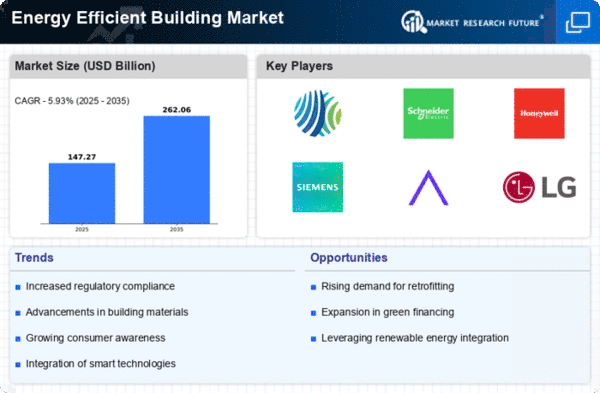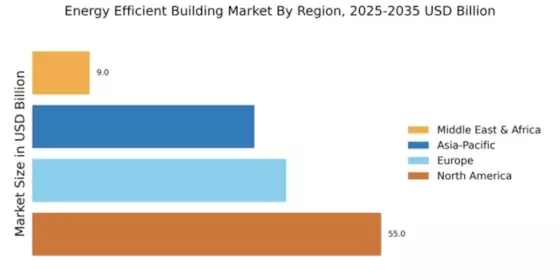Rising Energy Costs
The escalating costs of energy are a significant driver for the Global Energy-Efficient Building Market Industry. As energy prices continue to rise, both consumers and businesses seek ways to minimize their energy expenditures. Energy-efficient buildings offer a viable solution by reducing overall energy consumption and lowering utility bills. This trend is particularly evident in regions where energy costs are soaring, prompting a shift towards more sustainable building practices. Consequently, the market is poised for growth as stakeholders recognize the long-term financial benefits of investing in energy-efficient solutions.
Market Growth Projections
The Global Energy-Efficient Building Market Industry is projected to experience substantial growth in the coming years. By 2024, the market is anticipated to reach 139.0 USD Billion, with expectations to double to 262.0 USD Billion by 2035. This growth trajectory suggests a robust demand for energy-efficient solutions, driven by various factors such as technological advancements and regulatory support. The compound annual growth rate of 5.93% from 2025 to 2035 further indicates a promising outlook for the industry, as stakeholders increasingly prioritize sustainability in building practices.
Technological Advancements
Innovations in building technologies are pivotal to the expansion of the Global Energy-Efficient Building Market Industry. The integration of smart technologies, such as energy management systems and advanced HVAC solutions, enhances energy efficiency in buildings. These technologies not only reduce energy consumption but also improve occupant comfort. For instance, the adoption of IoT devices allows for real-time monitoring and optimization of energy use. As these advancements continue to evolve, they are likely to contribute to a compound annual growth rate of 5.93% from 2025 to 2035, further bolstering market growth.
Growing Environmental Awareness
The increasing global emphasis on sustainability and environmental conservation drives the Global Energy-Efficient Building Market Industry. As individuals and organizations become more conscious of their carbon footprints, the demand for energy-efficient buildings rises. This trend is reflected in various initiatives aimed at reducing greenhouse gas emissions. For instance, the European Union has set ambitious targets for energy efficiency, which could lead to a substantial increase in the market size. By 2024, the market is projected to reach 139.0 USD Billion, indicating a strong commitment to sustainable building practices.
Urbanization and Population Growth
Rapid urbanization and population growth are critical factors influencing the Global Energy-Efficient Building Market Industry. As cities expand and populations increase, the demand for housing and commercial spaces intensifies. This surge in demand necessitates the construction of energy-efficient buildings that can accommodate growing populations while minimizing environmental impact. Urban areas are increasingly adopting green building standards to ensure sustainable development. This trend is expected to drive market growth, as energy-efficient buildings become essential in meeting the needs of urban populations.
Government Incentives and Regulations
Government policies play a crucial role in shaping the Global Energy-Efficient Building Market Industry. Many countries are implementing stringent regulations and offering incentives to promote energy-efficient construction. For example, tax credits and rebates for energy-efficient upgrades encourage property owners to invest in sustainable technologies. The U.S. Department of Energy has launched programs that support energy-efficient building practices, which could significantly influence market growth. As these regulations become more widespread, the market is expected to expand, potentially reaching 262.0 USD Billion by 2035.

















